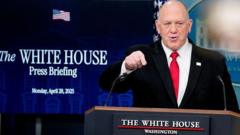**Two Conviasa flights carrying Venezuelan migrants from the U.S. arrive in Caracas, highlighting complex diplomatic relations between the U.S. and Venezuela, with implications for both the deported individuals and the broader geopolitical landscape.**
**Venezuela Accepts Deported Migrants Amid Diplomatic Strains**

**Venezuela Accepts Deported Migrants Amid Diplomatic Strains**
**Deportation flights from the U.S. to Venezuela mark a significant achievement for the Trump administration.**
In a noteworthy development amid often fraught diplomatic relations, two flights transporting Venezuelan migrants from the United States are scheduled to arrive in Caracas on Monday, a move hailed as a decisive success for President Trump’s deportation agenda. These flights, operated by the Venezuelan airline Conviasa, departed Fort Bliss, Texas, where numerous migrants face deportation protocols, around 10:45 a.m. and are expected to land at 7:15 p.m. local time, according to tracking data.
This event is significant given the longstanding tension between Washington and Caracas, particularly since 2019 when Venezuelan leader Nicolás Maduro refused to accept deported individuals, only allowing limited repatriations during the brief period of the Biden administration’s policies. Notably, this development follows a recent diplomatic mission by Trump adviser Richard Grenell, who engaged with Venezuelan authorities and successfully negotiated the return of six Americans previously detained by the Maduro regime.
The Venezuelan government has pertained to reports that it was notified by the U.S. of the presence of certain individuals on these flights linked to a notorious criminal network, Tren de Aragua, adding an additional layer of complexity to the situation. The Venezuelan administration has stated that these individuals would face thorough investigation upon their return, raising concerns about the potential legal ramifications and personal safety of the deported migrants.
This situation underscores the pressing political dynamics at play, with President Trump leveraging these deportation flights as part of his broader strategy to enforce strict immigration policies ahead of upcoming elections. Simultaneously, the implications for the deported individuals—some of whom may face legal actions or persecution in Venezuela—highlight ongoing human rights concerns and the precariousness of their status. Maduro himself remains under international scrutiny for various allegations, including narcotrafficking and crimes against humanity.
As this story unfolds, the international community watches closely, noting the potential impacts this development could have on U.S.-Venezuela relations and the broader context of migration, human rights, and international law.
This event is significant given the longstanding tension between Washington and Caracas, particularly since 2019 when Venezuelan leader Nicolás Maduro refused to accept deported individuals, only allowing limited repatriations during the brief period of the Biden administration’s policies. Notably, this development follows a recent diplomatic mission by Trump adviser Richard Grenell, who engaged with Venezuelan authorities and successfully negotiated the return of six Americans previously detained by the Maduro regime.
The Venezuelan government has pertained to reports that it was notified by the U.S. of the presence of certain individuals on these flights linked to a notorious criminal network, Tren de Aragua, adding an additional layer of complexity to the situation. The Venezuelan administration has stated that these individuals would face thorough investigation upon their return, raising concerns about the potential legal ramifications and personal safety of the deported migrants.
This situation underscores the pressing political dynamics at play, with President Trump leveraging these deportation flights as part of his broader strategy to enforce strict immigration policies ahead of upcoming elections. Simultaneously, the implications for the deported individuals—some of whom may face legal actions or persecution in Venezuela—highlight ongoing human rights concerns and the precariousness of their status. Maduro himself remains under international scrutiny for various allegations, including narcotrafficking and crimes against humanity.
As this story unfolds, the international community watches closely, noting the potential impacts this development could have on U.S.-Venezuela relations and the broader context of migration, human rights, and international law.























